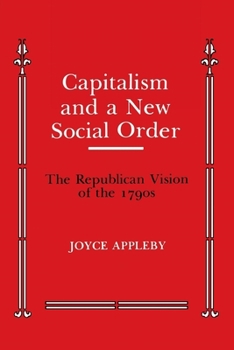Capitalism and a New Social Order: The Republican Vision of the 1790s
Select Format
Select Condition 
Book Overview
Examines the vision of Jeffersonian Republicans and their impact on early American politics
Format:Paperback
Language:English
ISBN:0814705839
ISBN13:9780814705834
Release Date:August 1984
Publisher:New York University Press
Length:122 Pages
Weight:0.45 lbs.
Dimensions:0.4" x 5.9" x 9.0"
Customer Reviews
4 ratings
The triumph of democracy in 1800 explained
Published by Thriftbooks.com User , 22 years ago
Appleby's book demonstrates that the ascendancy of the Jeffersonian Republicans in 1800 was in itself perhaps as revolutionary as the War for Independence. The classical republican ideas of rule by virtuous elites, adherence to tradition, deference to superiors, etc all subscribed to by the Federalists were attacked as being contradictory with the aims of the Revolution.Appleby argues very persuasively that the rise of market relations was also very destabilizing to hierarchical social and economic relations. Throughout the 18th century the idea that an economic system in which individuals acted in their own self-interest would yield a result most beneficial to the greater public gained widespread hearings. In the Republican view such a system required property-owning men free from such restraints as tariffs, excise taxes, and any other market interferences which was contrary to the mercantilist ideas of the Federalists.The French Revolution was a catalyst in the formation of Republican political societies in the 1790s where Federalist policies were roundly attacked. Even the successful prosecution of several Republican newspaper editors under the Federalist-backed Sedition Act of 1798 could not stem the attacks on Federalist ideas of privilege and elite control. The author contends that the rise of the Republicans was nothing less than the triumph of an idea of the essential equality of all men.The commercial enterprise in which most colonials were engaged was the production of foodstuffs for the European market. Other enterprises arose to support this increased production by farmers. This very short book ends with the election of 1800 before the rise of industrialism and such distinctions as employer versus employee. A concluding chapter would have been most welcome that addressed the Republican response to a more complex economic world. I did enjoy the book but I do believe that not examinig its ideas in the context of the 19th century is a shortcoming.
New Liberalism
Published by Thriftbooks.com User , 23 years ago
This study showed a new liberalism that developed at the begining of the American Republic.Ms.Applby shows how the Jeffersonian Republicans rejected the old"country party" ideology of their English ancestors and developed a more libertarian and socially liberal view of society.She shows how the Republicans rejected the old ideas of order,deference,and class that shaped colonial society.She also points out how the Jeffesonians rejection of mercantilism began an "american" ideal of free trade,low taxes and sufferage for the common man.The study points out how the Jeffersonians combining of diverse elements:merchants,tradesmen,and wealthy plantation owners were bound not by an egalitarian ideal of equality,by by an ideal of equality of opportunity within the new american nation.Overall an excellent study.
An Attempt to Explain the Origins of American Capitalism
Published by Thriftbooks.com User , 24 years ago
Jeffersonian democratic faith was sabotaged by the Second Great Awakening and by an unparallel industrial growth: the Awakening cut dry the secular faith in human order and the industrial growth further divided workers from employers. This is what Joyce Appleby nostalgically perceived that happened after the glorious victory of American new Republicanism powerfully emerged in 1800. Her attempt to jointly explain the economic and ideological transformation experienced in the U. S. at the turn of the century have the tendency to present the two opposing political orientations as highly cohesive in themselves. In 1790s the Federalists defended the traditional concept of society of distrust in the human being in which laws are to maintain a certain social order and in which virtue was the quality of unselfish concern for community. The Jeffersonians, in the other hand, promoted the idea of limiting government and engendering egalitarian goals. One of Appleby's main contributions is the idea that the Jeffersonians were open to economic development. Indeed, economic development and political democracy complemented and reinforced each other. Appleby's assertion rejects traditional American history. Advanced economic development has usually been portrayed as encouraged by the elitist Federalist Party for the benefit of a small socio-economic elite. The democratic Jeffersonian Republicans, on the other hand, have traditionally been identified as agrarians and as inheritors of an English country tradition. It is against this backdrop of historiography that Appleby's works makes more sense and appears to contribute. To make her point forcibly understood, Appleby make it clear that Englishmen did not "travel lightly" when they left their English ports toward America. They carried with them the ideas of a conservative society. The ideas that motivated colonial leaders were ancient ones going back to classical texts of politics. Classical theory emphasized the fragility of society; that society was composed by the talented few and the ordinary many. Appleby asserts that there were indications of strong Europeanization: to lose one's access to property at a time of rising land prices and the consequently breach among classes. And it was not until their idea of being an Englishman differed from the one held in Britain than Americans were forced to defined theirs separately. Their idea of an unselfish virtuous man evolved into the concept of self-interest benefiting society by the natural balance of collective interest. The advanced ideas of free trade that would provide the foundation for American capitalism were at the base of this Jeffersonian utopia too. Undoubtedly, Appleby's book reflects a movement against the fascination of modern liberals for the civic unselfishness of Classical Republicans. Despite Appleby's well-organized lines of arguments, even the non-expert may notice some inconsistencies. First, the reader may be struck by the ideological (and emo
way better than the other guy says
Published by Thriftbooks.com User , 24 years ago
This book really is quite good. Don't listen to the other reviewer





